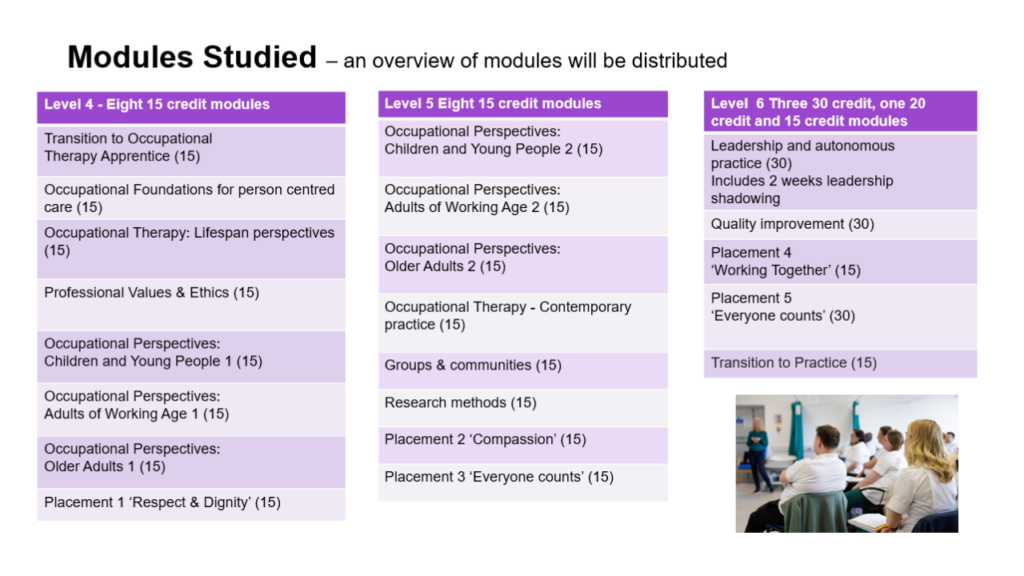Welcome to the Occupational Therapy section of this online resource. Please take a moment to familiarise yourself with this programme, and don’t hesitate to get in touch with the Programme team for any queries.
Programme Intent
The Degree Apprentice programme recognises the diversity of occupational therapy practice and embraces a commitment to produce practitioners who are cognisant of health and social disparities and promotes an inclusive and participatory society.
Occupational therapy encompasses a holistic approach to both mental and physical health and wellbeing, working in partnership with people in a range of health and social care settings to improve health and wellbeing. It facilitates individuals to achieve their full potential through participation in meaningful occupations and activities of everyday life.
The programme philosophy is viewed through the lens of human occupation and an ethos of person-centred care and quality improvement; these concepts are threaded throughout the programme.
Implementation
The programme integrates academic study with practice-based learning across all years of study. Drawing on an enquiry-based approach, learning is designed around scenarios involving individuals, carers, families, groups and communities from birth to end of life. These are used as triggers for discussion of the learning and to plan self-directed study. By delivering curricula using adult learning theories, critical thinking, reflection, problem-solving and decision-making, skills that are key to risk assessment and autonomous occupational therapy practice, are enhanced. This enables the graduate to be adaptable, resourceful and responsive to changes in health and social care encouraging professional and personal development enabling the graduate to form a clear identity as an Occupational Therapist. It also recognises learners’ past and current experiences and their value and contribution to the learning process.
This integrated approach embeds knowledge of occupational science and best evidence, thereby leading to the learners’ ability to become autonomous, enterprising and innovative practitioners who are active research consumers and enables graduates to work as part of a multidisciplinary team. The acquisition of the core Occupational Therapy knowledge and skills is facilitated by empowering the learner to be responsible for their learning and to be able to apply this learning to practice. It also encourages, from the outset, a commitment. Practice placements are introduced in year 1 and continue throughout the programme. these placements provide a range of experiences in different settings and sectors enabling a broad understanding of the value and contribution of Occupational Therapy.
Impact
The programme affords learners the opportunity to acquire the knowledge, skills and competencies to apply for registration as Occupational Therapists with the Health and Care Professions Council (HCPC) and to become members for the Royal College of Occupational Therapists (RCOT). The programme aligns with all required benchmarks and standards including those related to the degree apprenticeship (ST0517).
Key Contacts
| Role | Name | Contact |
| Programme Leader | Claire Lancaster | c.lancaster2@herts.ac.uk |
| Administrative Queries | Programme team | generalOTDA@herts.ac.uk |
| Apprenticeship Coaches/Personal Tutors | Claire Lancaster Sarah Lewis David Lacy Lindsay Truran Georgia Twigg Joanne Grunbaum Falguni Kothari | c.lancaster2@herts.ac.uk s.lewis7@herts.ac.uk d.lacy@herts.ac.uk l.truran@herts.ac.uk g.twigg@herts.ac.uk j.grunbaum@herts.ac.uk f.kothari@herts.ac.uk |
Programme Visual

Preparing for EPA
Progression towards the knowledge, skills and behaviours required for the End Point Assessment is discussed at each tripartite progress review meeting.
The final academic module transition to Practice supports apprentices in preparing for End Point Assessment.
The EPA is undertaken when the employer and the University are satisfied that the apprentice is consistently working at or above the level set out in the occupational standard and the apprentice has achieved 360 credits of the BSc (Hons) in Occupational Therapy. The EPA starts with the examination board and finishes when the University confirms a pass on all modules and sends the apprentices’ details to HCPC. The apprentice separately applies for registration once they have achieved a pass on all modules and sends the apprentices’ details to HCPC. The apprentice separately applies for registration once they have achieved a pass.
It is the role of the Mentor to officially sign the apprentice off as “occupationally competent” as an Occupational Therapist and the mentor is supported by the AC with all the information to make this decision. A comprehensive Gateway to EPA Checklist underpins this activity.
Sample mapping of your KSB’s to modules









